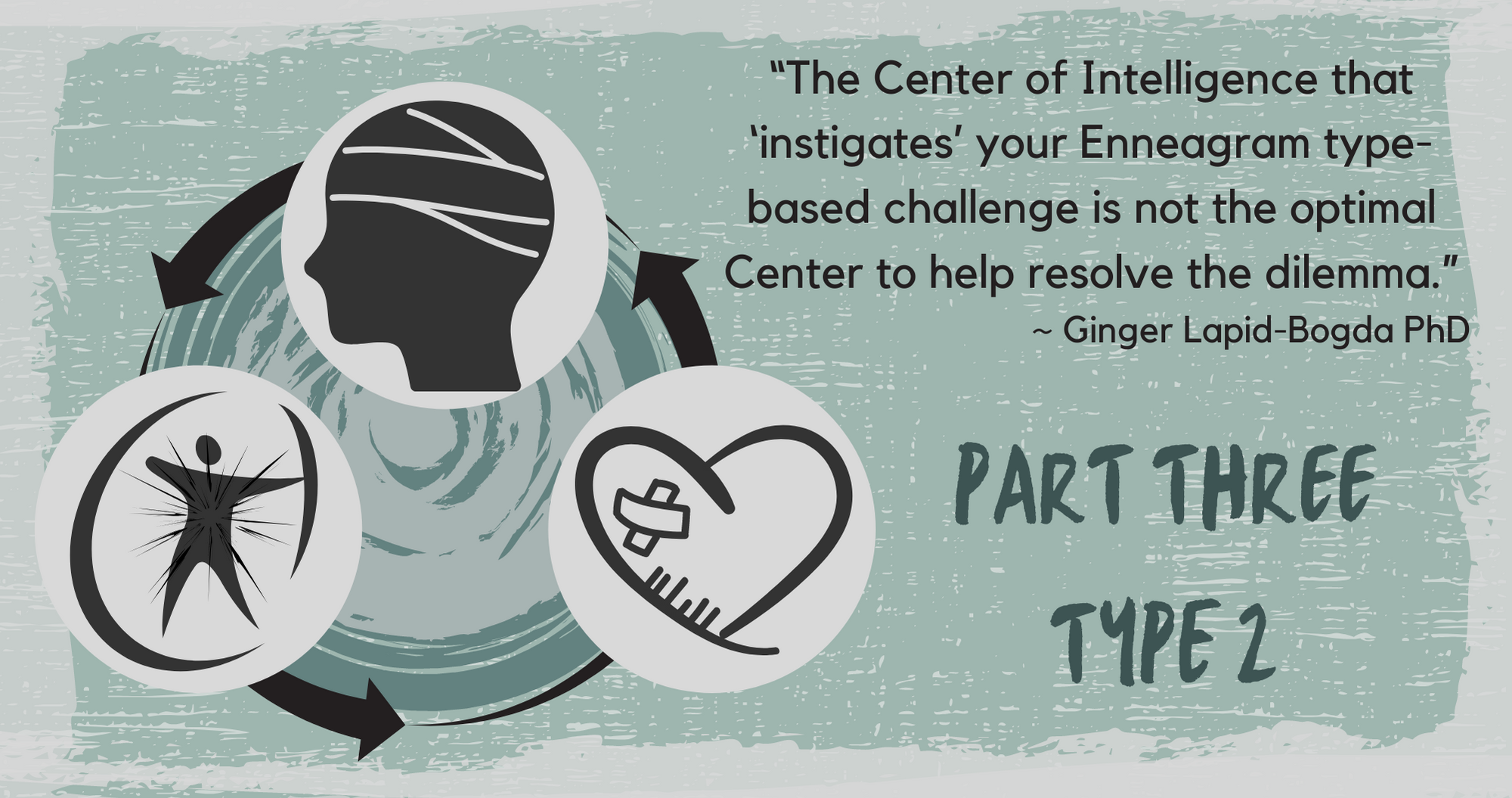 Although this statement may sound counter-intuitive, over years of working with people and groups on the Enneagram-based development, this has proven to be more accurate than not. Of course, working with the Center of Intelligence that instigates the challenging dynamic can be effective, it is simply more difficult. If the Head Center is the instigator, can the Head Center easily change course? To clear the Mental Center, soothe the Heart Center, or calm or embody the Body Center, another Center of Intelligence can be called into service to help support the desired growth and transformation.
Although this statement may sound counter-intuitive, over years of working with people and groups on the Enneagram-based development, this has proven to be more accurate than not. Of course, working with the Center of Intelligence that instigates the challenging dynamic can be effective, it is simply more difficult. If the Head Center is the instigator, can the Head Center easily change course? To clear the Mental Center, soothe the Heart Center, or calm or embody the Body Center, another Center of Intelligence can be called into service to help support the desired growth and transformation.
This 9-nine-part blog series will clarify this developmental idea for each of the 9 Enneagram types, with this blog focusing on Enneagram Twos.
A common type Two development area
Feeling responsible when others suffer
When Twos perceive others as suffering, they often feel responsible for doing something to help alleviate the situation, the circumstances, the other person’s response to the event(s), or just about anything that might lessen the hardship. Just about anything will do, and Twos can be highly resourceful as they try so very hard to remedy the situation. And try they do; otherwise, Twos feel responsible for lessening others’ pain and guilty if they are unable to do so. To be clear, it’s not that Twos think they are the cause of another person’s suffering; they, do, however, feel responsible for doing something about it.
Instigating the above response is the Twos’ Heart Center. Yes, Twos are generally sensitive to the feelings of others and compassionate, with the Twos’ ego-structure strongly identified with being a giving person, not a selfish person. And of course, what’s wrong with being sensitive and responsive to the suffering of others? Nothing, except…when a person believes and feels it is their responsibility to always do something, this can be an unwarranted burden and not always the best for the person in pain. The burden involves Twos’ becoming extremely over-extended in terms of their own time, resources and attention to their own well-being and their own suffering. In addition, much can be learned from suffering; a Two’s interception of another person’s pain can limit the learning and it may also be unwanted. Add to this the guilt Twos experience if their actions or solution do not work well or the frustration and sadness if their assistance is rejected.
There is more to this than Twos just being sensitive, good, thoughtful and compassionate people. Enter the Twos’ passion or emotional habit of ‘pride,’ which can be understood as an excessive belief in one’s own abilities or capacities. In the case of Twos, this excessive belief is related to their being able to help and support others. Claudio Naranjo referred to this as a false reality of false abundance – the sense in Twos that they can and should provide all the resources others need at any given time. Thus the challenge of feeling responsible when others suffer, while ignited by the Heart Center, also has a Mental Center component.
For the above reason, the Body Center provides a point of change for the issue of pride that underlies the Twos’ sense that they can and should help others. Pride somatically is experienced as a self-inflation or self-deflation depending on whether or not the Twos’ actions are well-received or poorly received by others. Somatically, Twos experience an expansion, swelling and enlargement in their chest area when things go well; this self-inflation is actually pride, although Twos mistake it for positive self-esteem. When things do not go well, Twos experience contraction and withering in their chest area; this self-deflation is also pride, although Twos mistake this for negative self-esteem.
The following somatic activity does wonders for working with the Twos’ challenge of feeling responsible when others suffer; it focuses on pride from a somatic perspective. Every time something good happens – something in which you played a role – AND you feel your heart Center expanding or getting bigger, bring that expansion inward slightly, then allow it to go outward more, then bring it inward. In other words, play with that somatic energy so you no longer automatically go into full expansion. Do the same thing when you feel your Heart Center contracting over something in which you played a role, and it did not go well. Breathe into your Heart Center and bring that somatic energy more into balance. Practicing the above every time you either inflate or deflate makes a big difference. Note that it will be easier to work on managing the inflation somatic energy than the deflation; both are important.
Ginger Lapid-Bogda PhD, author of eight Enneagram books, is a speaker, consultant, trainer, and coach. She provides certification programs and training tools for business professionals around the world who want to bring the Enneagram into organizations with high-impact business applications. TheEnneagramInBusiness.com | ginger@theenneagraminbusiness.com

Comments are closed.